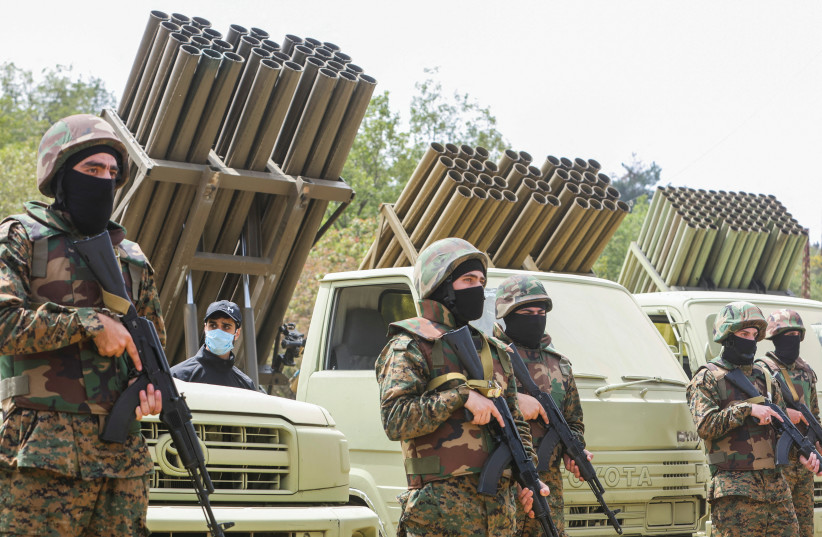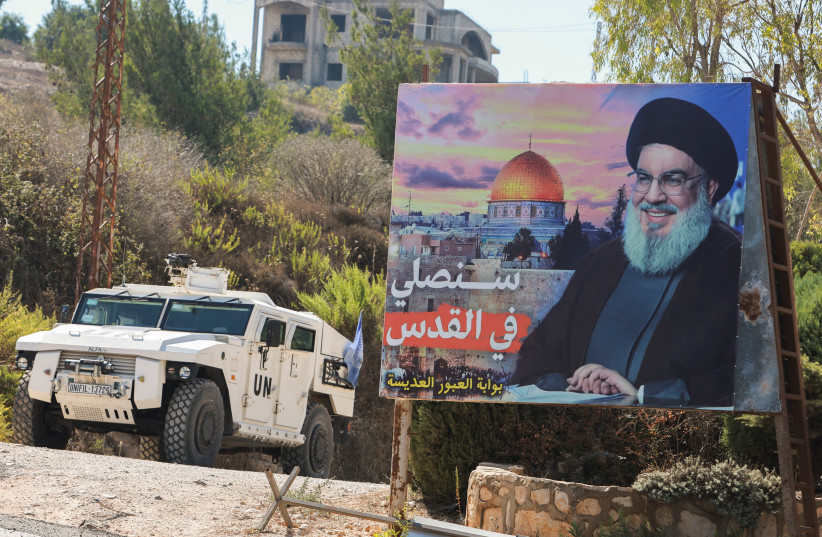Hezbollah seeks to stoke tensions with Israel over Ghajar – analysis
Hezbollah and other political ideologies in Lebanon are seeking to create a crisis with Israel by stoking tensions with the Jewish State over the northern border. The Islamist party is focusing on several areas including the Mount Dov area, where Hezbollah has set up tents in the last months, and the village of Ghajar.
The goal in each case is to create tensions over a largely immaterial issue, and then having created the issue and the crisis, to claim that this crisis is now a red line for potential conflict and seek to get concessions. Hezbollah has learned that this works since it sought to dictate part of the maritime deal that Lebanon engaged in with Israel.
Over the weekend I went to Ghajar to see if the tensions that had appeared to grow recently were manifested on the ground. There was no evidence of tensions in the air.
Some tourists were visiting the village, which was recently opened to tourism after many years of being closed. Restaurants offered homecooked meals and food trucks awaited more tourists. An IDF soldier sat inside a concrete guard house at the entrance.
Nearby, outside Metulla, UN forces were conducting a sweep of an area near a stream that leads to Nahal Ayun. A Palestinian flag on a hill near the border, in Lebanon, was in tatters. Clearly, the activists who put it there to show it off to Israel had not replaced it in a while. However, behind the scenes, there are tensions and Hezbollah is trying to make them grow.
 HEZBOLLAH MEMBERS take part in a military exercise during a media tour organized for the occasion of Resistance and Liberation Day, in Aaramta, Lebanon, last month. (credit: AZIZ TAHER/REUTERS)
HEZBOLLAH MEMBERS take part in a military exercise during a media tour organized for the occasion of Resistance and Liberation Day, in Aaramta, Lebanon, last month. (credit: AZIZ TAHER/REUTERS)A recent report from Israel’s N12 said that there was a US proposal to Israel that, in exchange for Hezbollah withdrawing its tents, Israel would stop the construction of a barrier. Hezbollah has recently raised the issue of Ghajar, claiming Israel’s creation of any kind of barrier or fence is a land grab.
Hezbollah will do what it can to manufacture issues and create tensions
Hezbollah has raised this as an example, similar to its claims to Mount Dov, as a reason to create a cause for tensions. Hezbollah has also set up tents on Mount Dov. Thereby, it is creating two separate issues that it may then try to link together: Ghajar to Mount Dov. This is an example of Hezbollah’s creation of new facts and lines. It takes existing disputes that go back as far as 23 years, when Israel left Lebanon in 2000, to create artificial tensions.
Lebanon’s Prime Minister, for instance, met with UNIFIL. Prime Minister Najib Mikati held talks with UNIFIL Commander Aroldo Lazaro, according to reports. Israel’s goal is to get Hezbollah to remove the tent they put inside the border at Mount Dov. Lebanon now wants Israel to pull back from Ghajar.
Israel is, so far, being cautious and working with relevant organizations such as the UN. However, Lebanon appears to be pushing this cause.
Lebanon lacks a president and this may be a welcome distraction for Lebanese politicians to show how “patriotic” they each are by claiming to demand something they didn’t care about a few months ago. Israel is the convenient cause for them.
An article in Lebanese media outlet Naharnet cited a statement from Lebanese politicians that read “Change MPs Melhem Khalaf, Najat Aoun, Elias Jradi, and Firas Hamdan will head Sunday to the Ghajar village ‘that is besieged by the Israeli enemy.’”
The report further noted, “Hezbollah had on Thursday denounced Israel for building a concrete wall around Ghajar, calling on the Lebanese state to take action to ‘prevent the consolidation of this occupation’ by Israel of Ghajar, home to around 3,000 people.”
The Naharnet report noted “The so-called Blue Line cuts through Ghajar, formally placing its northern part in Lebanon and its southern part in the Israeli-occupied and annexed Golan Heights. The residents of Ghajar have been granted Israeli citizenship rights, and Israel has recently opened the town, along a military zone, to tourism.”
Lebanon is trying to put pressure on Israel over this issue. According to reports, the activists in Lebanon want their citizens to be able to enter Ghajar. This would create a security issue and clearly is meant as a kind of provocation or demand that won’t be met.
Another report from the website Arab48 indicated that the Lebanese foreign ministry was “following with interest” this issue.
 A UN peacekeepers (UNIFIL) vehicle drives near a picture showing Lebanon’s Hezbollah leader Sayyed Hassan Nasrallah in Adaisseh village, near the Lebanese-Israeli border, southern Lebanon, October 11, 2022 (credit: REUTERS/AZIZ TAHER)
A UN peacekeepers (UNIFIL) vehicle drives near a picture showing Lebanon’s Hezbollah leader Sayyed Hassan Nasrallah in Adaisseh village, near the Lebanese-Israeli border, southern Lebanon, October 11, 2022 (credit: REUTERS/AZIZ TAHER)Al-Mayadeen, which is considered pro-Iran, went on to note that Lebanon had not acted in the past to “restore” either Ghajar or other villages taken from Lebanon in the 1920s. The issue had “returned to the forefront of attention after Hezbollah’s statement, in which it warned of the danger of aggressive measures, [and] can be considered an indication of the Lebanese state’s abuse of Lebanon’s southern borders.”
Hezbollah is trying to ride this issue and is clearly saying what it intends to do. Russia’s Sputnik also took up the cause on its Arabic site, claiming that Lebanese politicians “explained that the vast majority of representatives, who represent the broadest group of citizens, adopt the same position.” The report continues. saying that this “indicates the correctness and eligibility of the issue and everyone’s commitment to the necessity of imposing state authority on all its lands.”
This is now both a cause celebre and casus belli for Lebanon and Hezbollah. As with the Maritime issue, they work in concert to create new demands and then claim that if the demands are not met they have a right to create tensions. Hezbollah has already created these tensions through its tents in Mount Dov, creating facts on the ground and a kind of legitimized institutional presence to then “return” to if they are removed.





Comments are closed.